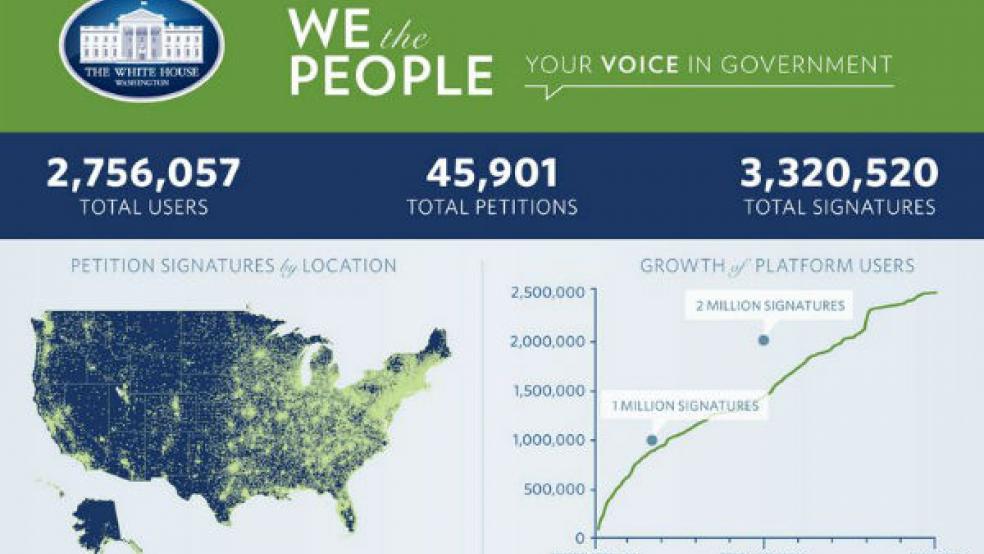The Obama administration, arguably the first White House to truly embrace the use of social media, is big on civil engagement. But to date, one of its most high-profile efforts to get the general public engaged in policy debates has brought it mostly mockery and headaches.
"We the People,” an online platform launched by the White House in September 2011, gives any American with a cell phone or a computer the opportunity to take advantage of their constitutional right to petition the government.
Related: Immigration Tech System Wastes Well Over $1.7B
The basic idea, as described on the site, is to “give Americans a way to engage their government on the issues that matter to them.” Individuals can enter a petition, and if it receives a certain number of “signatures,” the administration promises to respond.
Americans in the digital age have interpreted their right to petition in a variety of different ways. Since its inception, the administration has responded to 150 petitions - ranging from the lighthearted, like one to get the White House’s beer recipe, to the more serious, such as a proposal to reduce the burden of student loan debt.
But nearly 10 million signatures into the experiment, what seemed like an honest and good-hearted initiative has generated its fair share of ill will and frustration.
First of all, it’s extremely hard for serious petitions to generate a response. In the early days of the site, the administration raised the signature threshold for an official White House response to 100,000 signatures within 30 days, up from just 5,000 signatures required when the site launched. The White House said the change was to “give the most popular ideas the time they deserve.”
Related: In a Fickle Shift, Tech Titans Embrace the GOP
“By design, only a tiny, tiny fraction of started petitions reach that threshold,” said J.H. Snider, president of the government reform institute iSolon.org and former fellow at Harvard Kennedy School of Government’s Shorenstein Center on the Press, Politics and Public Policy. “[That] can make the whole process very discouraging from the perspective of a grassroots organizer.”
And despite its assurances, the White House appears to view replying to popular petitions as an option rather than a requirement.
A handful of the 97 petitions currently on the site awaiting response have well over 100,000 signatures. One petition to declare the Muslim Brotherhood a terrorist group has over 210,000 signatures, and another to pardon Edward Snowden has had over 160,000 for more than a year.
The Snowden petition, for example, is “a classic case of a petition that's too politically hot to handle - or at least without generating a non-response response,” said Snider.
Related: Is Obama’s America Becoming More European?
Another problem is that actual action has rarely been the result of We the People petitions – something that was noted by whoever launched a petition urging the administration to “actually take these petitions seriously instead of just using them as an excuse to pretend you are listening.”
That one didn’t need to get to 100,000. Sensing a potential PR problem. The White House stepped in when it had only a little more than 37,000.
The White House’s official response: “We're listening. Seriously.”
Unfortunately, the administration didn’t really have a lot to back up the claim.
“[G]athering enough signatures to meet the signature threshold does not guarantee that the Administration will change our policy on a specific topic. But in many cases, petitions posted on We The People have helped spur discussions of important policy issues,” said Director of the Office of Digital Strategy Macon Phillips in response, citing three examples to show that Americans were being heard in Washington.
One petition to combat online piracy led to “a discussion among policy experts at the White House that eventually led to the response.” Another one to digitize federal records led to the Archivist of the United States holding a conference call to get petitioners “ideas on how to move forward and how to prioritize which records were digitized first.”
Only one petition Phillips pointed to led to any actual policy proposal: to crack down on commercial breeders who sell puppies online.
Related: Tesla Tries to Speed Up Electric Car Biz
Another concern with the site is that it allows high-profile companies and individuals to create self-serving petitions that are more publicity stunts than legitimate proposals.
Last year, electric car maker Tesla Motors recently petitioned the White House to allow the company to sell their vehicles directly to consumers in all 50 states. Tesla argued that state legislators are unfairly shielding car dealers from competition. As of July 2013, it had received 138,469 signatures. Last week, the White House finally got around to responding, and noted that while the President loves sustainable transportation initiatives, the White House has no power to force states to change the way they regulate car dealerships.
Tesla executives undoubtedly knew this in advance, but that didn’t stop them from issuing angry statements condemning the administration’s failure to act.
While We the People probably hasn’t turned out quite the way the White House anticipated, iSolon.org’s Snider said that, in public policy terms, it hasn’t been a total loss.
“Just because the White House punts doesn't mean that the petition process isn't valuable,” he said.
Indeed, some of the current petitions have sparked meaningful debate - both in living rooms around the country and in Washington. But as petitions like the one to let unaccompanied alien children to live at the White House or another to nominate former President George W. Bush as U.S. Ambassador to Iraq prove not all are necessarily born of such lofty ideas.
Top Reads from The Fiscal Times:





